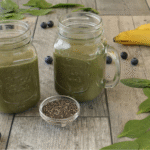Asthma is a chronic respiratory condition that makes breathing difficult due to inflammation and narrowing of the airways. Millions of people worldwide suffer from asthma, and while medical treatment is essential, many also turn to natural remedies for asthma to help manage symptoms and improve quality of life. This article will explore effective home-based solutions, lifestyle adjustments, and dietary changes that may ease asthma symptoms naturally.
Asthma causes symptoms such as coughing, wheezing, chest tightness, and shortness of breath. Triggers include allergens, pollution, respiratory infections, stress, and even certain foods. While inhalers and medications prescribed by doctors remain the primary treatment, combining them with natural remedies for asthma may provide additional relief.
Effective Natural Remedies for Asthma
1. Ginger
Ginger has anti-inflammatory properties that can relax the airways. Drinking ginger tea or consuming fresh ginger with honey helps reduce airway inflammation and supports lung health.
2. Turmeric
Turmeric contains curcumin, which acts as a natural antioxidant and anti-inflammatory compound. Drinking warm turmeric milk can help reduce asthma-related inflammation and boost immunity.
3. Garlic
Garlic contains natural antibacterial and anti-inflammatory properties. Adding raw or cooked garlic to your meals may help open up the airways and fight infections that trigger asthma attacks.
4. Honey
Honey is a soothing agent for the throat and lungs. A spoonful of honey mixed with warm water or herbal tea can reduce coughing and clear mucus.
5. Omega-3 Fatty Acids
Foods like fish, flaxseeds, and walnuts are rich in omega-3 fatty acids, which help reduce inflammation in the lungs and improve breathing patterns.
6. Steam Inhalation
Inhaling steam with a few drops of eucalyptus oil can loosen mucus, clear blocked airways, and provide instant relief from congestion.
7. Yoga and Breathing Exercises
Pranayama (breathing exercises) helps strengthen the lungs and increase oxygen intake. Regular yoga practice reduces stress, which is a major trigger for asthma.
8. Vitamin D
Low vitamin D levels are linked with increased asthma symptoms. Spending time in sunlight or taking vitamin D supplements may help improve respiratory health.
9. Caffeine
Caffeine in coffee or tea acts as a mild bronchodilator. It relaxes the airway muscles and improves airflow, offering short-term relief.
10. Herbal Teas
Herbal teas made with tulsi (holy basil), licorice root, or chamomile can soothe the respiratory system and reduce inflammation.
Diet Tips for Asthma Management
A balanced diet can play a big role in controlling asthma symptoms. Here are some dietary suggestions:
- Eat More: Fresh fruits, leafy vegetables, whole grains, and omega-3-rich foods.
- Avoid: Processed foods, carbonated drinks, excessive salt, sulfite-rich foods (like dried fruits and wine), and fried snacks.
- Stay Hydrated: Keep yourself hydrated with plenty of water to maintain moist airways and avoid mucus congestion.
Lifestyle Changes for Asthma Relief
- Maintain a healthy weight to reduce pressure on the lungs.
- Exercise regularly but avoid overexertion. Select low-impact exercises, including walking, yoga, or swimming.
- Stay away from cigarette smoke and pollution.
- Use air purifiers at home to reduce dust and allergens.
- Manage stress through meditation and relaxation techniques.
Precautions
While natural remedies for asthma can be highly beneficial, they should not replace prescribed medications. Always consult your doctor before starting any home remedy, especially if you have severe asthma.
FAQs About Natural Remedies for Asthma
Q1: Can natural remedies cure asthma completely?
No, natural remedies cannot cure asthma. They can only help reduce symptoms and improve overall lung health.
Q2: Is ginger tea good for asthma?
Yes, ginger tea may help reduce inflammation and relax the airways, making it easier to breathe.
Q3: Can yoga really help with asthma?
Breathing exercises along with yoga help improve lung capacity and ease stress, making them highly beneficial for asthma patients.
Q4: Which foods should asthma patients avoid?
Asthma patients should avoid fried foods, processed snacks, and sulfite-containing foods like dried fruits and wine.
Q5: Is honey safe for asthma relief?
Yes, honey is safe and effective in soothing the throat, reducing cough, and easing mucus buildup.
Asthma is a long-term condition, but with the right combination of medical care, lifestyle adjustments, and natural remedies for asthma, you can manage symptoms effectively. Herbal solutions, breathing exercises, and a balanced diet play an important role in improving lung health naturally.
👉 For more health tips


